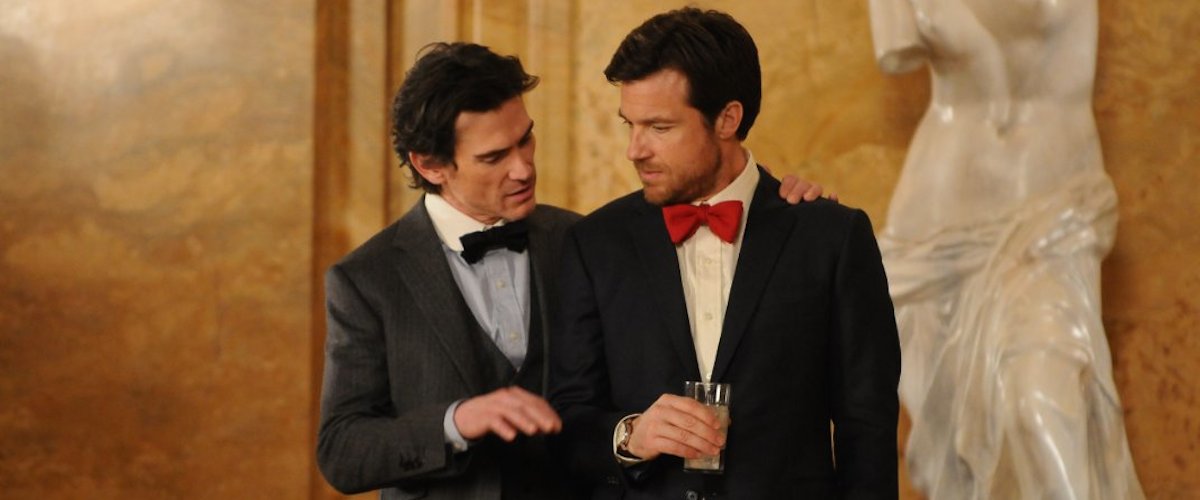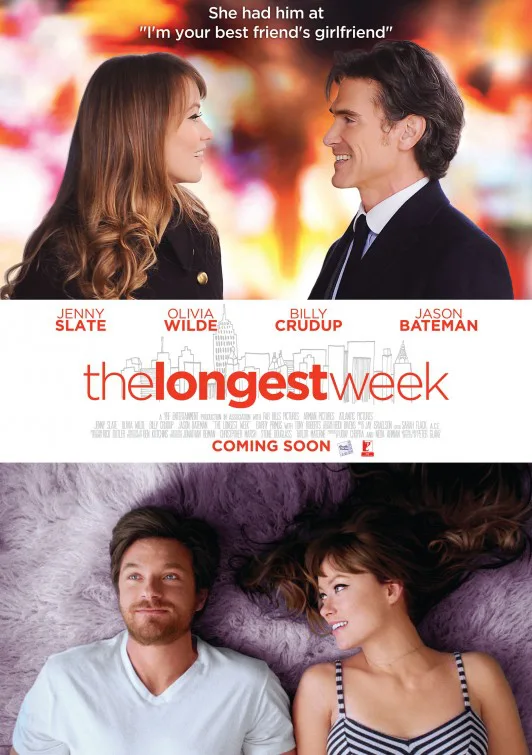“The Longest Week” has been sitting on a shelf since it was completed back in 2012 and is only now being dribbled into theaters in the presumed hope that the combination of a few familiar faces in the cast and a dearth of other new releases might inspire some bored and/or brave moviegoers to plop down a few bucks to check it out. Alas, unless your hunger for watching dimly conceived comedy-dramas focusing on obnoxious and over-privileged jerks Coming to Terms with Things was not sated with the recent “Last Weekend,” most viewers will spend most of the running time wishing that they had simply stayed home and watched that “Saved by the Bell” docudrama that you DVR’d but haven’t quite summoned up the courage to watch as of yet.
Jason Bateman stars as Conrad Valmont, a ridiculously wealthy child of privilege who has thus far frittered away his life on wine, women and a career as a would-be novelist who has yet to actually complete a work, let alone publish or sell it. As the story opens, his divorcing parents have had enough and not only cut him off financially but kick him out of the hotel that they own and where he has lived since childhood. Once the news finally sinks in, the now-penniless Conrad moves in with frenemy Dylan (Billy Crudup), a struggling artist who nevertheless has actually completed the odd painting or two, and after meeting his new girlfriend, model Beatrice (Olivia Wilde), impulsively decides to steal her away from his friend despite his lack of funds or even a place to live.
After watching “The Longest Week” for only a few minutes, most viewers will easily begin to discern the central artistic influences of debuting writer-director Peter Glanz—it includes, among other things, the arch visual style and droll narration of Wes Anderson (primarily “The Royal Tenenbaums“), the New York locations and highfaluting literary/psychoanalytical references of Woody Allen (not to mention Tony Roberts in a supporting role) and characters who seem to live in an insular world of their own a la Whit Stillman. (He also throws in a brief homage to the Madison sequence from Godard’s immortal “Band of Outsiders” for good measure.) One could hardly pick three better filmmakers to follow in the footsteps of than this particular trio but it also becomes obvious within a few minutes that while Glanz is able to offer up a vague simulacrum of their most overt artistic traits, he has no discernible sense of what it is that makes them tick and what makes their work so distinctive.
Glanz so closely appropriates the look and feel of Anderson’s films throughout that it could easily be mistaken for an especially dry spoof of his idiosyncratic formalism until the realization is made that he is trying to be totally serious in this regard. Likewise, the dialogue is archly conceived as can be but there is hardly a single line here that sounds like anything that an actual human being might say in real life. In fact, the only line that rings even remotely true comes when the narrator (Larry Pine) at one point intones “His pseudo-intellectual banter was wearing thin.” This may sound dumb out of context but when compared to the likes of “You want to smell sexually ambiguous?” and “She was a hopeless romantic and he was hopelessly romantic,” you will want to stitch it into a sampler as quickly as possible. As for the characters spouting these lines, they are so resolutely unappealing—even the ones we are supposed to like—that it is impossible to work up any sort of rooting interest in them or their problems.
Not even the able actors that Glanz somehow managed to rope into his project can do much with the draggy story and the vapid characters that they have been given to play. Bateman, who excels at playing fundamentally decent people trying and usually failing to do fundamentally indecent things, is simply miscast as a straight-ahead jerk and cannot find any entry point to make his character even remotely accessible to viewers. At least he gets a character—disagreeable and uninteresting as he may be—to play, which is more than can be said for Crudup and Wilde. Crudup’s character is so thinly conceived that he barely seems to exist while the normally likable Wilde is stuck playing a person even more vapid and devoid of interest than the one she played in the comparatively execrable “Third Person.”
The only person to come out of “The Longest Week” looking comparatively good is Jenny Slate, who, despite her prominent billing in the credits, turns up in a couple of scenes as a friend of Beatrice’s who is roped into going on a double-date with Conrad but winds up in bed that night with Dylan instead. She also gets to deliver the one speech that actually works, in which she decries a play that she has just seen—not to mention the film we are watching, implicitly—as being a tired study of unlikable people of affluence who have plenty of money and prestige but no moral compass to speak of. Perhaps her delivery of this dialogue struck a little too close to home because soon after this scene, she pretty much disappears from the film for good. Believe me, most viewers will want to join her.




















